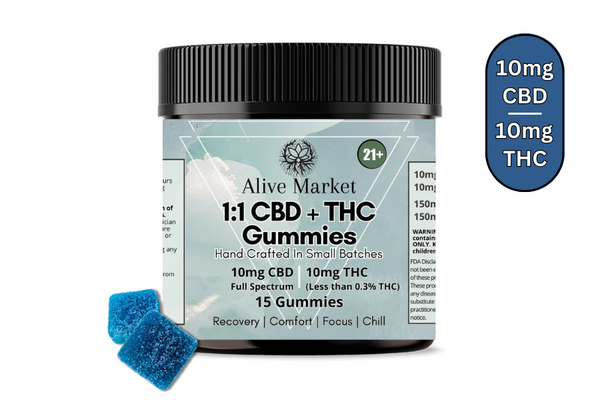In the realm of cannabis exploration, understanding the nuances between its various compounds is paramount. Among these cannabis compounds alone, THCA (tetrahydrocannabinolic acid) and THC (delta-9-tetrahydrocannabinol) stand out as key players, each offering unique characteristics and potential therapeutic benefits. As interest in cannabis for both recreational and medicinal purposes continues to grow, distinguishing between THCA and THC becomes increasingly important.
THCA and THC are closely related but exhibit distinct properties that influence their effects on the body and mind of both cannabis users and consumers. While THC is well-known for its psychoactive properties and therapeutic potential, THCA has garnered attention for its purported health benefits, particularly in its raw form. But when it comes to potency and strength, which reigns supreme: more potent THCA or THC?
In this comprehensive exploration, we delve into the differences between THCA and THC, examining their chemical structures, potential health benefits, and effects on the human body. By shedding light on this often misunderstood topic, we aim to empower readers to make informed decisions about cannabis consumption and better understand the complexities of this fascinating plant. Join us as we unravel the mysteries of THCA versus THC and uncover which compound emerges as the stronger contender.
What is THCA?
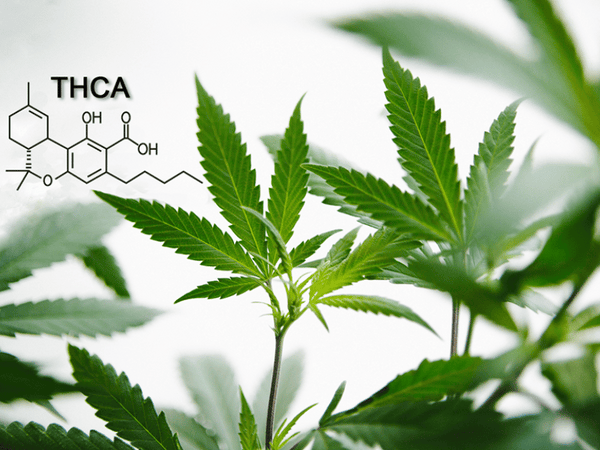
THCA, or tetrahydrocannabinolic acid, is a precursor to THC found in raw cannabis plants. This means that no matter how much THCA you consume from freshly harvested cannabis plants (unheated), you won't succumb to its intoxicating effects. Unlike THC, THCA is non-intoxicating, meaning it does not have the psychoactive effects but has therapeutic benefits, but most people never consume it. That's because it converts to THC when heated through a process called decarboxylation – all cannabis/hemp flower is really THCa flower, but the THCa converts to THC before you inhale it.
Definition and Chemical Structure
THCA (tetrahydrocannabinolic acid) shares a similar chemical structure to THC but with a notable difference: a carboxylic acid group (COOH) attached to the molecule. This extra carboxylic acid group is what distinguishes THCA from THC and contributes to its non-psychoactive nature.
Found in Raw Cannabis
In its natural state, cannabis plants contain THCA rather than THC. THCA (tetrahydrocannabinolic acid) is abundant in the freshly harvested cannabis plants' flowers, leaves, and stems. It's also present in smaller quantities in other parts of the marijuana plant itself, such as seeds and roots.
Potential Health Benefits
While research on THCA (tetrahydrocannabinolic acid) is still in its early stages, preliminary studies suggest that this compound may offer various health benefits, particularly in its raw form.
Some potential therapeutic effects of THCA include:
Anti-inflammatory Properties

THCA has shown promise in reducing inflammation, which is implicated in various chronic conditions such as arthritis and inflammatory bowel disease.
Neuroprotective Effects
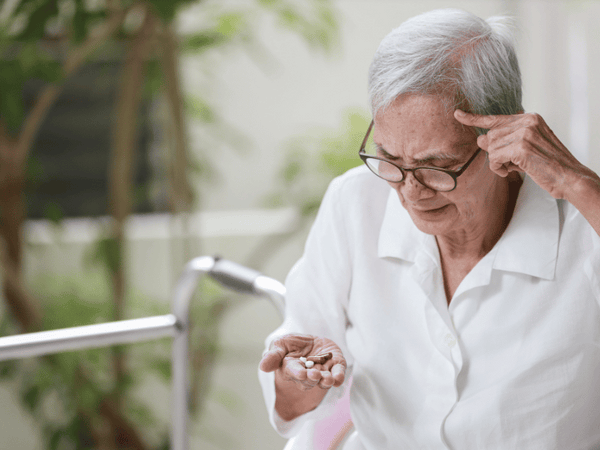
Studies suggest that THCA may have neuroprotective properties, potentially offering protection against neurodegenerative diseases like Alzheimer's and Parkinson's.
Although more research is needed to fully understand the extent of its therapeutic potential, THCA holds promise as a valuable component of cannabis with possible health-promoting effects.
What is THC?
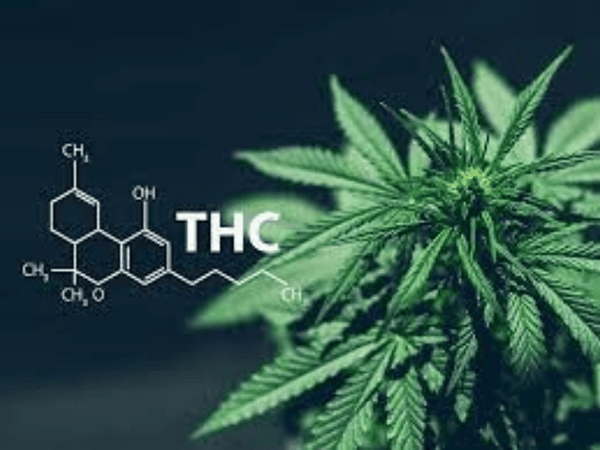
THC, or delta-9-tetrahydrocannabinol, is one of the most well-known cannabinoids found in cannabis. It is primarily responsible for the psychoactive effects commonly associated with cannabis consumption. THC differ specifically targets cannabinoid receptors in the brain and central nervous system in its interactions with the body's endocannabinoid system.
Definition and Chemical Structure
Chemically, THC is similar to THCA but lacks the carboxylic acid group present in its precursor. This structural difference is what enables THC to bind with cannabinoid receptors in the body and induce psychoactive effects.
Psychoactive Effects

The psychoactive effects of THC are what distinguish it from other cannabinoids. When ingested, THC attaches itself to the brain's CB1 cannabinoid receptors, which causes a variety of effects, such as:
-
Euphoria
-
Relaxation
-
Altered perception of time and space
-
Enhanced sensory perception
-
Increased appetite (commonly referred to as "the munchies")
These psychoactive effects contribute to the recreational use of cannabis and have also led to the exploration of THC for medicinal purposes.
Medical Uses

Beyond its recreational use, THC has demonstrated therapeutic potential in managing various medical conditions.
Some of its medical uses include:
Pain Management

THC has analgesic properties and is often used to alleviate chronic pain, neuropathic pain, and pain associated with conditions like multiple sclerosis and cancer.
Nausea Relief
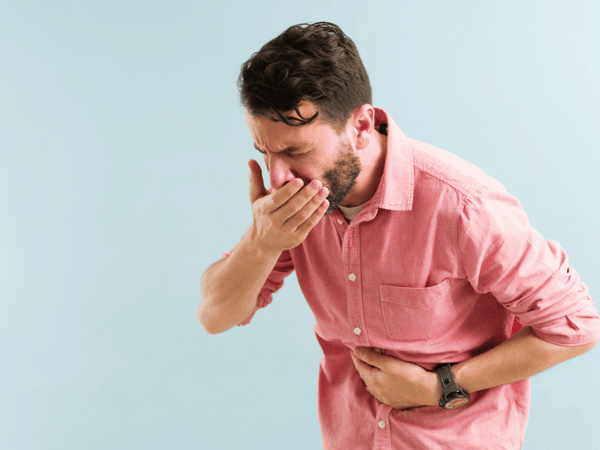
THC is anti-nausea and vomiting in people receiving chemotherapy or experiencing nausea related to other medical treatments since it possesses antiemetic qualities.
Appetite Stimulation

THC is well-known for its capacity to increase appetite, which makes it advantageous for people who are losing their appetite as a result of diseases like HIV/AIDS or cancer and its therapies. THC's ability to stimulate appetite is the origin of the term “munchies,” which refers to the feeling of hunger you get after smoking cannabis.
These therapeutic effects have led to the development of pharmaceutical formulations containing THC, such as dronabinol and nabilone, which are used to treat specific medical conditions.
Key Differences Between THCA and THC
While THCA and THC share similarities in their chemical structures and origins within the cannabis plant, they exhibit distinct properties that differentiate them from each other. Understanding these differences is crucial for grasping their respective effects on the body and mind.
Chemical Structure
The primary difference between THCA and THC lies in their chemical compounds, the THCA molecule contains a carboxylic acid group (COOH) attached to the THC molecule, whereas THC lacks this group. This structural variance affects how each compound interacts with the body's endocannabinoid system and influences their respective effects.
Psychoactive Effects
THCA is a non-psychoactive cannabinoid, meaning it does not produce intoxicating effects commonly associated with cannabis consumption. In contrast, THC is a highly psychoactive cannabinoid and is responsible for the euphoric "high" experienced when consuming raw cannabis or cannabis products high in THC content. This stark difference in psychoactivity is due to the activation of cannabinoid receptors in the brain by THC, leading to alterations in mood, cognition, and perception.
Bioavailability
Bioavailability refers to the extent and rate at which a substance is absorbed and reaches systemic circulation. In its raw form, THCA has limited bioavailability compared to THC. THCA requires decarboxylation, a process that removes the carboxylic acid group, to convert into THC and become bioavailable. This conversion typically occurs through heating, such as smoking, vaping, or cooking raw cannabis into products.
Potential Health Benefits
Both THCA and THC exhibit potential health benefits, albeit through different mechanisms of action. While THCA's potential therapeutic benefits are predominantly attributed to its anti-inflammatory and neuroprotective properties, THC's therapeutic effects extend to pain management, nausea relief, and appetite stimulation. The varying health benefits of THCA and THC highlight the importance of considering individual needs and preferences when exploring cannabis as a therapeutic option.
Understanding these key differences lays the foundation for comparing the potency and strength of THCA versus THC, which we'll delve into in the following section.
THCA vs THC: Which is stronger?
THCA vs THC - The question of which compound is stronger? —is multifaceted and depends on various factors, including the conversion process, dosage, and individual tolerance levels. To determine potency, it's essential to consider these factors and their impact on the effects produced by each compound.
Factors Influencing Potency
Decarboxylation Process: The potency of marijuana and smoked cannabis or marijuana extracts with THCA vs THC is heavily influenced by the decarboxylation process. THCA must undergo a process called decarboxylation, typically through heating, to convert into THC and become a psychoactive compound. The extent of decarboxylation affects the concentration of active THC in cannabis products, ultimately determining their potency.
Dosage: The potency of both THC and THCA also depends on the dosage consumed. Higher doses of THC are likely to produce more pronounced psychoactive effects compared to lower doses. Similarly, the potency of THC and THCA-containing products may vary depending on the concentration of both THC and THCA and other cannabinoids present.
Individual Tolerance: Individual tolerance levels play a significant role in determining perceived potency. Individuals with higher tolerance to THC may require larger doses to achieve desired effects, while those with lower tolerance may experience stronger effects from smaller doses. Similarly, individual responses to THCA may vary based on factors such as metabolism, genetics, and previous cannabis exposure.
Comparing Psychoactive Effects
THC, as the primary cannabinoid, is renowned to produce intoxicating effects, which include euphoria, relaxation, altered perception, and increased appetite. These intoxicating effects are largely absent in THCA due to its non-psychoactive nature. Therefore, in terms of producing intoxicating effects, THC is generally considered stronger than THCA.
Potential Therapeutic Efficacy
When comparing the potential therapeutic benefits and efficacy of THCA and THC, the picture becomes more nuanced. While THC offers a broader range of therapeutic effects due to its psychoactive nature, THCA may exert beneficial effects through mechanisms such as anti-inflammatory and neuroprotective pathways. The potency of these effects may vary depending on the specific health condition and individual response to treatment.
In conclusion, the question of which compound is stronger—THCA vs THC—is not straightforward and depends on various factors. While THC is stronger in terms of producing psychoactive effects, the potency of both compounds for therapeutic purposes may vary depending on individual needs and preferences.
How to Consume THCA and THC
Consumption methods play a crucial role in the potency, onset, and duration of effects experienced with THCA and THC. Understanding the different methods of consumption can help individuals tailor their cannabis experience to their specific needs and preferences.
Methods of Consumption
Smoking/Vaping
Smoking cannabis or vaping the cannabis plant is one of the most common methods of consumption. When the cannabis plant flowers are heated, whether through combustion (smoking) or vaporization (vaping), THCA undergoes decarboxylation, converting into THC and becoming a non-psychoactive cannabinoid. This method offers rapid onset of effects and precise dose control.
Edibles
Consuming cannabis extracts and infused edibles is another popular method, especially for individuals seeking long-lasting effects. Edibles undergo a process called decarboxylation during the cooking process, activating the THC present in the cannabis extract or infused ingredients. However, it's essential to note that the onset of effects with edibles is typically slower compared to smoking or vaping, and dosing can be more challenging to control.
Topicals
Topical cannabis products, such as creams, lotions, and balms, are designed for external application to the skin. While these products may contain THCA or THC, they are not typically used for their psychoactive effects. Instead, topicals are primarily used for localized relief of pain, inflammation, and skin conditions without inducing intoxication.
Pros and Cons of Each Method
Smoking/Vaping
Pros: Fast onset of effects, precise dose control, customizable experience.
Cons: Potential respiratory irritation with smoking, short duration of effects.
Edibles
Pros: Long-lasting effects, discreet consumption, no respiratory irritation.
Cons: Slow onset of effects (up to 1-2 hours), potential for accidental overconsumption, variability in potency among products.
Topicals
Pros: Targeted pain relief for localized symptoms; no psychoactive effects.
Cons: Limited systemic absorption may not be effective for certain conditions.
Considerations for Dosage and Potency
Regardless of the consumption method chosen, it's essential to consider dosage and potency when using THCA- or THC-containing products. Start with a low dose and gradually titrate upwards to achieve the desired effects while minimizing the risk of adverse reactions. Pay attention to product labeling, which should indicate the concentration of THCA, THC, or other cannabinoids present.
Understanding how different consumption methods affect the potency and onset of effects can empower individuals to make informed decisions about their cannabis use and optimize their cannabis experience.
Safety and Legal Considerations
As with any substance, responsible use of cannabis user's THCA vs THC-containing products is essential to ensuring safety and compliance with applicable laws and regulations. Understanding potential benefits, risks, and legal considerations associated with cannabis consumption can help individuals make informed choices and minimize harm.
Risks Associated with THC Consumption
Psychological Effects
THC consumption may lead to temporary impairments in cognitive function, including memory, attention, and decision-making. Excessive THC consumption or use in vulnerable populations, such as adolescents, may increase the risk of adverse psychological effects.
Respiratory Effects
Smoking cannabis can irritate the respiratory tract and may exacerbate existing respiratory conditions, such as asthma or chronic bronchitis. Vaporizing cannabis may offer a safer alternative to smoking, as it produces fewer harmful byproducts.
Impaired Driving
THC consumption can impair motor coordination, reaction time, and judgment, increasing the risk of accidents and impaired driving. It's crucial to avoid driving or operating heavy machinery while under the influence of THC.
Legal Status of THCA and THC
Is THCA legal as well as THC? The legal status of marijuana for cannabis consumers of THCA and THC-containing products varies depending on jurisdictional regulations. While some regions of the cannabis world have legalized cannabis for medical and/or recreational use, others maintain strict prohibitions on cannabis cultivation, possession, and consumption.
Medical Use
In jurisdictions where medical cannabis is legal, patients with qualifying medical conditions may access cannabis products containing THC with a doctor's recommendation or prescription. However, regulations governing medical cannabis programs vary widely, and patients must adhere to local laws and guidelines.
Recreational Use
In jurisdictions where recreational cannabis is legal, adults of legal age may purchase and possess cannabis products for personal use. However, restrictions on purchase age, possession limits, and consumption settings may apply, and it's essential to familiarize oneself with local regulations.
Illegality
While THC is a controlled substance on a federal level, THCA isn't classified as a banned substance. In regions where cannabis remains illegal, possession, cultivation, and distribution of THCA- and THC-containing products are subject to criminal penalties. Engaging in illicit activities involving cannabis can result in legal consequences and jeopardize one's safety and well-being.
Recommendations for Responsible Use
To help the cannabis industry promote safe and responsible cannabis use, consider the following recommendations:
Know the Law: Familiarize yourself with local laws and regulations governing cannabis possession, cultivation, and consumption.
Start Low, Go Slow: Begin with low doses of THCA- or THC-containing products and gradually increase dosage as needed while monitoring effects.
Avoid Mixing Substances: Avoid combining cannabis with alcohol or other drugs, as this may increase the risk of adverse effects and impairment.
Plan Ahead: If consuming cannabis, plan activities in advance and arrange for transportation to ensure safety.
By adhering to these guidelines and exercising caution, individuals can mitigate the risks associated with THCA and THC consumption and make informed decisions about their cannabis use.
Conclusion
In this exploration of THCA versus THC, we've delved into the intricacies of these two cannabinoids, examining their chemical structures, potential health benefits, and effects on the body and mind. While THCA and THC share similarities as components of the cannabis plant, they exhibit distinct properties that influence their potency, psychoactive effects, and therapeutic potential.
THCA, as the precursor to THC, offers non-psychoactive therapeutic benefits such as anti-inflammatory and neuroprotective properties. However, it requires decarboxylation to become a psychoactive compound and exert its full therapeutic effects. On the other hand, THC is renowned for its psychoactive effects and broader range of therapeutic applications, including pain management, nausea relief, and appetite stimulation.
When considering potency and strength, factors such as the decarboxylation process, dosage, and individual tolerance levels play crucial roles. While THC is generally stronger in terms of producing psychoactive effects, the potency of both THCA and THC for therapeutic purposes may vary depending on individual needs and preferences.
It's important for individuals to understand the different methods of consuming THCA and THC, along with the associated risks and legal considerations. Responsible use, informed decision-making, and adherence to local laws and regulations are paramount to ensuring safety and minimizing harm.
As research on cannabis continues to evolve, so too will our understanding of THCA and THC and their potential applications in health and wellness. By staying informed and approaching cannabis use with caution and responsibility, individuals can harness the potential benefits of these cannabinoids while minimizing risks.
In closing, the comparison between THCA and THC offers a glimpse into the complexity of cannabis and the diverse array of compounds it contains. Whether seeking pain relief from symptoms or exploring recreational use, understanding the nuances of THCA and THC empowers individuals to make choices that align with their well-being and preferences.
Thank you for joining us on this journey of exploration and discovery.


